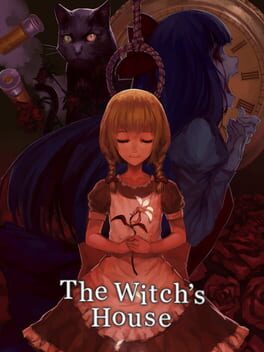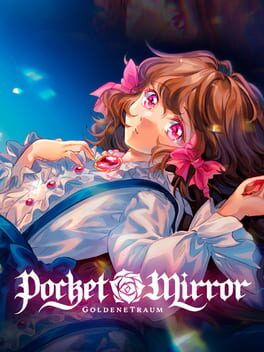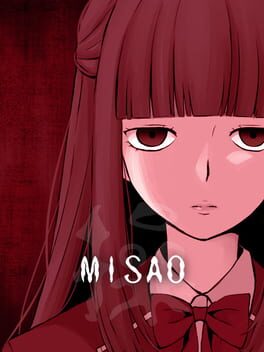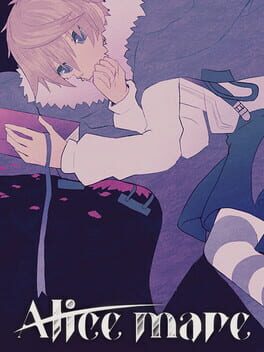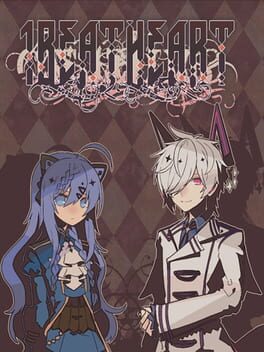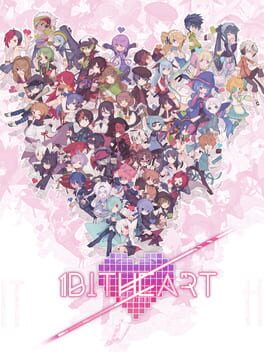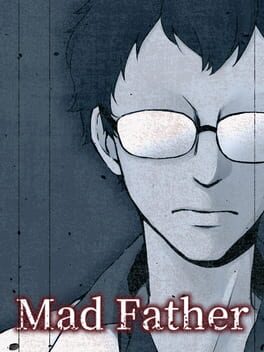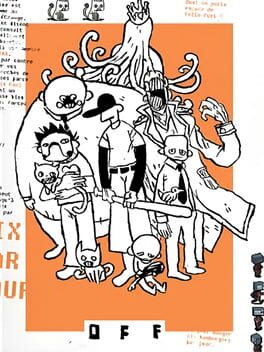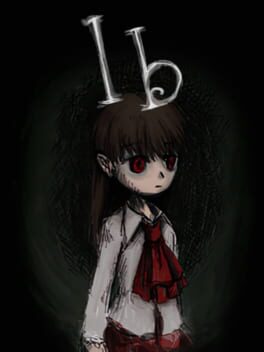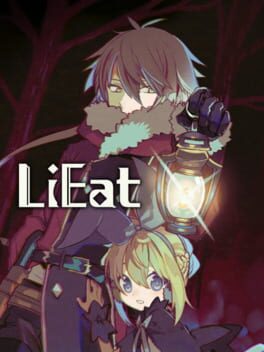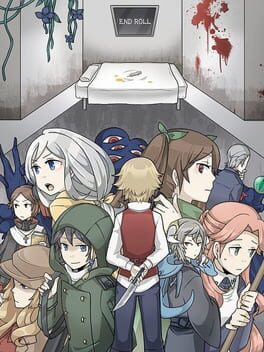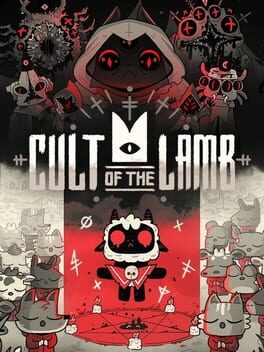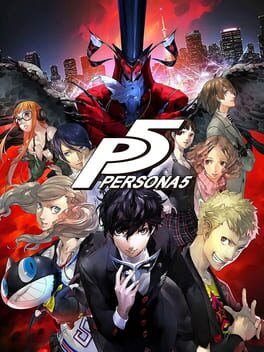poochy
2012
The epitome of short but sweet, it's clear why this game is another foundation of the RPG Maker horror genre. It's incredibly creepy and maintains a constant tension, but has a sense of humor about it too. Graphics and music aren't anything to write home about, certainly lacking the aesthetic identity its closest companion game Ib has, but they do the job. The whole arc with the frog companion was really great, especially with the punchline towards the end of the game. Yeah, the punchline was me being murdered, but I couldn't even be mad about it.
I wish the cat that acted as your save point throughout the game didn't say "Yo." every time you met them though. It's an incrutiably small nitpick... but it was still a kinda unfitting choice!
Puzzles are the focus and generally well done, aside from one or two I had to look at a guide to figure out. Interestingly, one of the last puzzles in the game was removed in the version I was playing--no clue what was up with it. The game also LOVES throwing in chase scenes with instant death conditions, ratcheting up the tension of course, but felt a bit overplayed by the end of it.
Probably the only other thing of note was the true ending, nothing truly mindblowing, but it still got me! I am not immune to a concise yet effective twist, or a concise yet effective game!
I wish the cat that acted as your save point throughout the game didn't say "Yo." every time you met them though. It's an incrutiably small nitpick... but it was still a kinda unfitting choice!
Puzzles are the focus and generally well done, aside from one or two I had to look at a guide to figure out. Interestingly, one of the last puzzles in the game was removed in the version I was playing--no clue what was up with it. The game also LOVES throwing in chase scenes with instant death conditions, ratcheting up the tension of course, but felt a bit overplayed by the end of it.
Probably the only other thing of note was the true ending, nothing truly mindblowing, but it still got me! I am not immune to a concise yet effective twist, or a concise yet effective game!
Pocket Mirror ~ GoldenerTraum (what a wonderful mouthful of a subtitle) was one of the games on this RPG Maker journey I knew the least about going into it. A friend just sent me the Steam page for it when it went on sale and I picked it up more or less on a whim. In many ways I was expecting another one of those, and in most aspects it is a fairly typical RPG Maker horror game, but its scope and structure does a lot to elevate it to be easily the most unsettling... and probably the most impressive.
In many ways, the game I want to compare it to most is Yume Nikki. They are drastically different games, yet Pocket Mirror hits at the same feeling of wandering aimlessly through lurid landscapes with but a vague idea of what your end goal is meant to be. There is plenty of dialogue and NPCs and jokes and the like, but the game remains oppressively opaque in its structure from start to very near the finish, keeping information on the world and your end goal dangled precariously in front with only vague hints given. Every time you try to claw for more information, the game gives off just a trickle of the truth, before taking another step back into the darkness.
The game's length benefits this a lot as well; in general just having more stuff in the game makes it harder to gauge where exactly you're at. There's little padding here. The number of different locations with completely unique visuals you go through, many of which you're in for barely more than a couple minutes, is downright impressive. Particularly in the last 2 hours, the game funnels you through setpiece after the insane setpiece that left me constantly awestruck. The production values are ridiculously good, easily the highest of any of these games I've played. A particular highlight from early in the game was when a character stomp down and it caused the screen to have a massive crack it in, which remained for that entire gameplay segment.
Another surprise is the fairly low gameplay density. Most of the game is just wandering down hallways and experiencing the vibes, with a couple of chase sequences throughout. Puzzles are strewn fairly far apart from each other and mostly take the form of riddles, albeit pretty well-done ones, and even they more or less disappear towards the end of the game. Ib easily has more puzzles in it overall despite being a fraction of the length. This isn't particularly an issue--as I said before the vibes each new area give off are more than enough--though a couple more puzzles in the final sections would probably smooth out the experience a bit more.
The game's opacity is most strongly felt in its story, almost to a frustrating degree. Even single major character in the game feels like they're leading you on, knowing things you don't and refusing to divulge no matter how much you beg and plead. There is a decent bit of drawn out, repetitive dialogue between the main characters that you KNOW will lead nowhere, but the main character is desperate enough to keep on trying. It treads a fine line between being endearing and annoying, but I think it ultimately tilts a bit more towards the later. Once I hit the credits, I still only had a vague idea of what the game's story was actually about. After reading another review and the developer's AMA, I more or less understand what happened, but its something I'm not sure I would've pieced together fully on my own.
The game have 5 endings total and I only got the first one, the one most people would get on their initial run, and then watched the bad ending on YouTube. Siliconera's page titled "Here's How to Get All Endings in Pocket Mirror GoldenerTraum" says the bad ending ironically spells out the game's story most clearly. I don't know if I agree with that assessment but I get where they're coming from. I do wanna go for the true ending soon--and it's one of those I don't know how you would get without a guide unless you were really lucky with dialogue choices--but the game's length is putting me off for right now. Soon though! I'll update this review when I do if I feel the need to.
Despite a couple of minor frustrations, the game holds one ultimate success so few games are able to: feeling like an honest to god adventure. Going through so many different locations, having not a faintest clue what couple be around the corner, interacting within this tangible world, it's all really impressive. I don't think there's any one thing in the game that elevates it to something truly special, but it remains an enchanting experience I thoroughly enjoyed.
In many ways, the game I want to compare it to most is Yume Nikki. They are drastically different games, yet Pocket Mirror hits at the same feeling of wandering aimlessly through lurid landscapes with but a vague idea of what your end goal is meant to be. There is plenty of dialogue and NPCs and jokes and the like, but the game remains oppressively opaque in its structure from start to very near the finish, keeping information on the world and your end goal dangled precariously in front with only vague hints given. Every time you try to claw for more information, the game gives off just a trickle of the truth, before taking another step back into the darkness.
The game's length benefits this a lot as well; in general just having more stuff in the game makes it harder to gauge where exactly you're at. There's little padding here. The number of different locations with completely unique visuals you go through, many of which you're in for barely more than a couple minutes, is downright impressive. Particularly in the last 2 hours, the game funnels you through setpiece after the insane setpiece that left me constantly awestruck. The production values are ridiculously good, easily the highest of any of these games I've played. A particular highlight from early in the game was when a character stomp down and it caused the screen to have a massive crack it in, which remained for that entire gameplay segment.
Another surprise is the fairly low gameplay density. Most of the game is just wandering down hallways and experiencing the vibes, with a couple of chase sequences throughout. Puzzles are strewn fairly far apart from each other and mostly take the form of riddles, albeit pretty well-done ones, and even they more or less disappear towards the end of the game. Ib easily has more puzzles in it overall despite being a fraction of the length. This isn't particularly an issue--as I said before the vibes each new area give off are more than enough--though a couple more puzzles in the final sections would probably smooth out the experience a bit more.
The game's opacity is most strongly felt in its story, almost to a frustrating degree. Even single major character in the game feels like they're leading you on, knowing things you don't and refusing to divulge no matter how much you beg and plead. There is a decent bit of drawn out, repetitive dialogue between the main characters that you KNOW will lead nowhere, but the main character is desperate enough to keep on trying. It treads a fine line between being endearing and annoying, but I think it ultimately tilts a bit more towards the later. Once I hit the credits, I still only had a vague idea of what the game's story was actually about. After reading another review and the developer's AMA, I more or less understand what happened, but its something I'm not sure I would've pieced together fully on my own.
The game have 5 endings total and I only got the first one, the one most people would get on their initial run, and then watched the bad ending on YouTube. Siliconera's page titled "Here's How to Get All Endings in Pocket Mirror GoldenerTraum" says the bad ending ironically spells out the game's story most clearly. I don't know if I agree with that assessment but I get where they're coming from. I do wanna go for the true ending soon--and it's one of those I don't know how you would get without a guide unless you were really lucky with dialogue choices--but the game's length is putting me off for right now. Soon though! I'll update this review when I do if I feel the need to.
Despite a couple of minor frustrations, the game holds one ultimate success so few games are able to: feeling like an honest to god adventure. Going through so many different locations, having not a faintest clue what couple be around the corner, interacting within this tangible world, it's all really impressive. I don't think there's any one thing in the game that elevates it to something truly special, but it remains an enchanting experience I thoroughly enjoyed.
A normal school day goes awry as the spirit of a dead classmate enacts her revenge on those who wronged her, while also wishing for your help to save her. One of the first rooms you stumble into has a vase of roses with a key within it. You try to grab it, prick yourself on the thorns, and die. A little while later you wander onto the roof, walk towards the edge, get pulled off the side by a ghost, and die again. Perhaps you pick up a book in the library then the bookshelf crushes you, and--surprise surprise--yet another death!
It took me until finding the list chronicling every single unique death you've occurred in the game for it all to click in. Misao may put on the guise of a typical RPG Maker adventure horror game at first, but this one is FUNNY AS HELL. While yes, you are wandering around solving fairly solid puzzles and collecting items--this is by the same developer of Mad Father and has a similar quality in that regard--the main perverse incentive is finding out how you'll get brutally murdered at every step. It's the most effective set-up/punchline repeated to great effect: you perform an action you probably shouldn't be doing and then you find out what the punishment is. Several deaths had me giggling by the intentional absurdity of them.
While I've played several incredibly brief RPG Maker games during this journey, this is the one that particularly stands out for one that gave me the greatest sense of "oh, it's almost over already?" when I realized I already acquired most of the key items required to complete the game. Not to say the game feels incomplete, but I feel the game would've benefited from having just a biiiit more area to explore. Its basement suggests the idea of there being something more to the game, akin to Mad Father's slow treck downward through each floor, but that was ultimately an area that took less than 5 minutes to go through. Again though, what's provided was a greatly enjoyable time, and the fact I wished for more of it is a testament to its gameplay quality more than anything.
The biggest issue with the game comes down to its story feeling... messy. I came out of the main story more or less understanding the character dynamics, which were nothing special but ultimately workable. Then the "Truth" epilogue was unlocked, a 20 or so minute anthology backfilling the character relations more. The information expounded there not only felt wholly unnecessary but left me more confused on what the relationships between some of the characters were. In particular, Misao and the player character felt like they kinda changed on a whim... which is the two characters that are the most important for that not to happen to!
There was one spoilery scene there that, while optional, left me completely confused at what this game was really supposed to be about, and not in a good way. You can read this incredibly succinct review that sums it up beautifully (again, spoilers): https://www.backloggd.com/u/thespanglemaker/review/906231/
Despite all that, Misao is a funny and competent adventure game worth the two hours and change it takes to finish. Just maybe skip the Truth section! It's totally fine if you do, you're not missing anything! Also choose to play as the female protagonist because they did the Persona 3 Portable thing of making her a bit more unhinged than the male protagonist, and why wouldn't you want that in a comedy game?
It took me until finding the list chronicling every single unique death you've occurred in the game for it all to click in. Misao may put on the guise of a typical RPG Maker adventure horror game at first, but this one is FUNNY AS HELL. While yes, you are wandering around solving fairly solid puzzles and collecting items--this is by the same developer of Mad Father and has a similar quality in that regard--the main perverse incentive is finding out how you'll get brutally murdered at every step. It's the most effective set-up/punchline repeated to great effect: you perform an action you probably shouldn't be doing and then you find out what the punishment is. Several deaths had me giggling by the intentional absurdity of them.
While I've played several incredibly brief RPG Maker games during this journey, this is the one that particularly stands out for one that gave me the greatest sense of "oh, it's almost over already?" when I realized I already acquired most of the key items required to complete the game. Not to say the game feels incomplete, but I feel the game would've benefited from having just a biiiit more area to explore. Its basement suggests the idea of there being something more to the game, akin to Mad Father's slow treck downward through each floor, but that was ultimately an area that took less than 5 minutes to go through. Again though, what's provided was a greatly enjoyable time, and the fact I wished for more of it is a testament to its gameplay quality more than anything.
The biggest issue with the game comes down to its story feeling... messy. I came out of the main story more or less understanding the character dynamics, which were nothing special but ultimately workable. Then the "Truth" epilogue was unlocked, a 20 or so minute anthology backfilling the character relations more. The information expounded there not only felt wholly unnecessary but left me more confused on what the relationships between some of the characters were. In particular, Misao and the player character felt like they kinda changed on a whim... which is the two characters that are the most important for that not to happen to!
There was one spoilery scene there that, while optional, left me completely confused at what this game was really supposed to be about, and not in a good way. You can read this incredibly succinct review that sums it up beautifully (again, spoilers): https://www.backloggd.com/u/thespanglemaker/review/906231/
Despite all that, Misao is a funny and competent adventure game worth the two hours and change it takes to finish. Just maybe skip the Truth section! It's totally fine if you do, you're not missing anything! Also choose to play as the female protagonist because they did the Persona 3 Portable thing of making her a bit more unhinged than the male protagonist, and why wouldn't you want that in a comedy game?
2013
Firstly, before getting to the review proper, this is the section where I want to comment on Miwashiba's extremely odd obsession with wanting people to play their kinda shitty version of Tetris they made. As I explained in my 1bitHeart review, that game forced playing either Tetris or Puyo Puyo on you if you didn't just max out your currency automatically. This one has the perhaps even weirder presence, with a NPC in every single area whose sole purpose is to ask "Wanna play The NuTetris?" and takes you to the... exact same version of Tetris with no point to it besides an achievement I did not bother with. What is going on here.
Anywayyyyyyyyyyys, Alicemare is the final of the 3 completed game from Miwashiba, except it's the first one they released due to me playing their gameography in reverse order. With this being the first game, the art understandably lacks a lot of the style that added so much to 1bitHeart and LiEat. However, even without some fancy aesthetics coating it, the game still holds fairly good and unsettling vibes. Each world you enter feels like some twisted fairlytale you are picking at the wallpaper of to reveal its truth.
The game does feel a bit rough around the edges and unfocused in parts. The puzzles are largely fine, certainly not to the level of Ib's puzzles (which I still feel are the gold standard of the RPG Maker games I've played). Many of them are moreso riddles than puzzles, with a couple bafflingly obtuse. One in particular I had to look up in a guide, and I still do not have the faintest clue how I was supposed to arrive to the solution.
Thematically the game also feels a little muddled, with the first bit of the game suggesting literal transfixions of classic fairytale stories, such as Little Red Riding Hood, just for it to be dropped halfway through. Still, the game has a couple of nice little stories that wrap together well enough. While I was left rather confused after finishing my first playthrough of the game, my second playthrough where I cleaned up the rest of the endings, including what could best be considered the true ending, shed a lot of light on every little aspect of the game and provided a satisfying enough closure to everything. The game also does something clever with its use of XXXX (you will understand if you play the game) that I did not pick up until my second playthrough that added a lot for me.
If you were to play the game yourself (I'd recommend it), look at vgperson's guide so you can clean up every single other ending on your second playthrough. I appreciated how easy it was to see them all in quick succession, as opposed to how a game like Ib makes most of its endings fairly mutually exclusive. However this game almost necessitates seeing most/all of its endings to put together all of the puzzle pieces as opposed to Ib's much more straightforward story, so it makes enough sense.
I was nervous going into this game after my experience with 1BeatHeart. When Miwashiba has provided me experiences of both impactful highs and incredibly frustrating lows, a just something pretty good all around, I was worried to be left feeling they've made more misses than hits. But thankfully, Alicemare is another short but sweet experience! Despite its shortcomings, it was a nice little dip into an interesting world I wouldn't mind seeing more of but at the same time feeling content with what I got.
I will never get over the Tetris thing though serious what the hell is up with that.
Anywayyyyyyyyyyys, Alicemare is the final of the 3 completed game from Miwashiba, except it's the first one they released due to me playing their gameography in reverse order. With this being the first game, the art understandably lacks a lot of the style that added so much to 1bitHeart and LiEat. However, even without some fancy aesthetics coating it, the game still holds fairly good and unsettling vibes. Each world you enter feels like some twisted fairlytale you are picking at the wallpaper of to reveal its truth.
The game does feel a bit rough around the edges and unfocused in parts. The puzzles are largely fine, certainly not to the level of Ib's puzzles (which I still feel are the gold standard of the RPG Maker games I've played). Many of them are moreso riddles than puzzles, with a couple bafflingly obtuse. One in particular I had to look up in a guide, and I still do not have the faintest clue how I was supposed to arrive to the solution.
Thematically the game also feels a little muddled, with the first bit of the game suggesting literal transfixions of classic fairytale stories, such as Little Red Riding Hood, just for it to be dropped halfway through. Still, the game has a couple of nice little stories that wrap together well enough. While I was left rather confused after finishing my first playthrough of the game, my second playthrough where I cleaned up the rest of the endings, including what could best be considered the true ending, shed a lot of light on every little aspect of the game and provided a satisfying enough closure to everything. The game also does something clever with its use of XXXX (you will understand if you play the game) that I did not pick up until my second playthrough that added a lot for me.
If you were to play the game yourself (I'd recommend it), look at vgperson's guide so you can clean up every single other ending on your second playthrough. I appreciated how easy it was to see them all in quick succession, as opposed to how a game like Ib makes most of its endings fairly mutually exclusive. However this game almost necessitates seeing most/all of its endings to put together all of the puzzle pieces as opposed to Ib's much more straightforward story, so it makes enough sense.
I was nervous going into this game after my experience with 1BeatHeart. When Miwashiba has provided me experiences of both impactful highs and incredibly frustrating lows, a just something pretty good all around, I was worried to be left feeling they've made more misses than hits. But thankfully, Alicemare is another short but sweet experience! Despite its shortcomings, it was a nice little dip into an interesting world I wouldn't mind seeing more of but at the same time feeling content with what I got.
I will never get over the Tetris thing though serious what the hell is up with that.
2017
vgperson's website describes 1BeatHeart as a "spinoff sequel" to 1bitHeart, which if read my review of, you would know how dearly I loved it. This game, while it certainly chronologically follows the original, ends up throwing out most of the original game's best elements in an oddly-guided game.
The game follows in the footsteps of the first game's bonus chapter that, as far as I can tell, was appended to its Steam release. Both of them present a post-game where the focus on making friends is entirely thrown out, instead dialing in on the detective work that made up a small portion of the original experience. For what its worth, the gameplay structure is certainly improved here, both through more tightly constructed narratives and UI enhancements. It's still a far cry from the best detective games though, like Ace Attorney and Somnium Files, and never escapes the feeling of just kinda going through the motions.
Frustratingly with this detective pivot, Nanshi, the protagonist of the first game I grew greatly attached to, is sidelined to being a helper character without much to do in the story. With the timeskip, he retains some of his mannerisms he once had and changes in ways that largely make sense, but it's hard to shake the feeling of "not my Nanashi" with this new him. In this game, he doesn't even go by Nanashi (but that won't stop me from calling him it)! He retains his repour with Misane, the new protagonist, but she just isn't nearly as interesting of a character and gets a lot less fleshed out with this gameplay structure compared to what Nanashi got in the original. The NPCs are fine, mostly there to fill in what they need to with the story and not much more, which is a major disappointment after the first game had such a wide cast of charming characters despite each only getting a short time in the limelight. Even LiEat, which Miwashiba developed between 1bitHeart and this, was able to provide a more interesting cast with a similar length and structure to this game. The characters from the original game outside of Nanashi and Misane are only present in short (albeit fun) cameos and references.
Another pivot is the games aesthetics, going more for a muted pallete and slightly reeled in soundtrack. While the original game's vibes were certainly more appealing personally, this game's fall in line well with the detective story its telling and still retain a lot of the charm from the original, so I feel bad faulting it too much. The few tracks with Spanish lyrics in them were also a fun surprise!
Heading into the end of the game, I was content on this being a fine enough 3, maybe 3.5/5. It isn't particularly notable in any way and generally disappointing following the first game, but it was a perfectly competent little murder mystery at the end of the day. And then I hit the ending of the game, or rather, the ending hit me. Abruptly.
The game somewhat wraps itself up, but not in a very satisfying way, as it shows this case being one part of a much wider case, as if this was but the first chapter of a game. It's understandable that the idea here was to give a short but sweet taste of the lives of the characters following the first game, but two key issues with it sour me.
One, the bonus chapter of the first game already did exactly that, including the ending of its case revealing itself to be a part of the EXACT SAME web as this game's mystery. Functionally, it feels like I went through the exact same type of story twice, which really makes me question why 1BeatHeart exists in the first place. This wouldn't be as much of an issue if it gave me more interactions of the characters I loved, but. two, the future Miwashiba gave for these characters just isn't very interesting! Why did they decide to transition this universe's story from a sci-fi world about a boy learning about himself through making friends to a fairly mundane detective story with a deemphasis on the sci-fi elements? Tacking it onto this world feels so arbitrary and, while it doesn't sour my enjoyment of the original game at all, does make me ultimately want to ignore this game's existence all together. Which for what is likely some of the only extension to the original game I loved so dearly, especially one so particularly niche... sucks!
Still better than Wadanohara though lmao
The game follows in the footsteps of the first game's bonus chapter that, as far as I can tell, was appended to its Steam release. Both of them present a post-game where the focus on making friends is entirely thrown out, instead dialing in on the detective work that made up a small portion of the original experience. For what its worth, the gameplay structure is certainly improved here, both through more tightly constructed narratives and UI enhancements. It's still a far cry from the best detective games though, like Ace Attorney and Somnium Files, and never escapes the feeling of just kinda going through the motions.
Frustratingly with this detective pivot, Nanshi, the protagonist of the first game I grew greatly attached to, is sidelined to being a helper character without much to do in the story. With the timeskip, he retains some of his mannerisms he once had and changes in ways that largely make sense, but it's hard to shake the feeling of "not my Nanashi" with this new him. In this game, he doesn't even go by Nanashi (but that won't stop me from calling him it)! He retains his repour with Misane, the new protagonist, but she just isn't nearly as interesting of a character and gets a lot less fleshed out with this gameplay structure compared to what Nanashi got in the original. The NPCs are fine, mostly there to fill in what they need to with the story and not much more, which is a major disappointment after the first game had such a wide cast of charming characters despite each only getting a short time in the limelight. Even LiEat, which Miwashiba developed between 1bitHeart and this, was able to provide a more interesting cast with a similar length and structure to this game. The characters from the original game outside of Nanashi and Misane are only present in short (albeit fun) cameos and references.
Another pivot is the games aesthetics, going more for a muted pallete and slightly reeled in soundtrack. While the original game's vibes were certainly more appealing personally, this game's fall in line well with the detective story its telling and still retain a lot of the charm from the original, so I feel bad faulting it too much. The few tracks with Spanish lyrics in them were also a fun surprise!
Heading into the end of the game, I was content on this being a fine enough 3, maybe 3.5/5. It isn't particularly notable in any way and generally disappointing following the first game, but it was a perfectly competent little murder mystery at the end of the day. And then I hit the ending of the game, or rather, the ending hit me. Abruptly.
The game somewhat wraps itself up, but not in a very satisfying way, as it shows this case being one part of a much wider case, as if this was but the first chapter of a game. It's understandable that the idea here was to give a short but sweet taste of the lives of the characters following the first game, but two key issues with it sour me.
One, the bonus chapter of the first game already did exactly that, including the ending of its case revealing itself to be a part of the EXACT SAME web as this game's mystery. Functionally, it feels like I went through the exact same type of story twice, which really makes me question why 1BeatHeart exists in the first place. This wouldn't be as much of an issue if it gave me more interactions of the characters I loved, but. two, the future Miwashiba gave for these characters just isn't very interesting! Why did they decide to transition this universe's story from a sci-fi world about a boy learning about himself through making friends to a fairly mundane detective story with a deemphasis on the sci-fi elements? Tacking it onto this world feels so arbitrary and, while it doesn't sour my enjoyment of the original game at all, does make me ultimately want to ignore this game's existence all together. Which for what is likely some of the only extension to the original game I loved so dearly, especially one so particularly niche... sucks!
Still better than Wadanohara though lmao
2015
When I first started playing 1bitHeart, I was immediately enraptured by the game's aesthetics. The aesthetic work of LiEat, from the same developer Miwashiba, was one of its main appeals and this game doubles down on it many-fold. The gameplay started out as a rather simple Ace Attorney-esque adventure game, all of it incredibly cute. I was ready for another really nice little experience from this developer.
Then I reached the "free time" portion of the game, which is something roughly akin to Persona's social link system, and I was instantly filled with terror. The loop of free time is to initiate conversations with NPCs in the world and see their stories, which you unlock by giving them their preferred gifts, which you buy with the in-game currency, which you unlock by... playing not very good versions of either Puyo Puyo or Tetris with pretty lousy payouts. Oh god. Was this the dealbreaker for the game? Am I really supposed to spend several hours grinding out puzzle games to experience more of this? Then save scum so I don't waste money giving people the wrong gift???
After a short period of this cycle, I reached for a guide. Surely there had to be a better way, right? I looked at the top Steam guide, and sure enough there was a header titled "There Has To Be A Better Way"! Turns out, there is a trivially-easy, infinitely-repeatable way to instantly max out your currency, then buy gifts to your heart's content. You even get an achievement for it!
When I give this game my highest regards, I do not claim 1bitHeart is at all some masterpiece in game design (there is a LOT of room for improvement in that regard). I do not claim it has some incredible story its holding that moved me to tears. I do not claim that anybody else who plays it is going to have nearly the experience with it that I did. BUT, the one thing I do claim is that 1bitHeart is one of the most Poochycore games ever created.
As is apparent from the jump, every element of the game is dripping with style. The character portraits are always a treat to see with each new character--jesus christ did they draw a lot of them really fucking attractive. Each of the five areas you visit are so full of their own personality, with a really cool monochromatic silhouette art style to them and wonderful music that sets each area's tone wonderfully. The music in general is, to put it bluntly, absolutely fucking insane, especially for a game of this scope. The variety of music is shockingly wide, with a lot of characters and conversations being backed by unique vocal tracks. At one point in the game there is a club mix of "Hallelujah", so baffling I couldn't help myself from breaking down laughing. It was so great.
The main story itself is, again, not anything incredible. It has a few points that I felt were a bit messy, but overall its nice and sweet and doesn't overstay its welcome. However, the biggest point of attachment though came from the wide variety of individual character stories I experienced. Each one is only 5-10 minutes long in total across 4 different cutscenes, but Miwashiba has shown how skilled they are at crafting these bite-sized stories between this and LiEat. Almost every character story offered something either cute or heartwarming or funny (more than one left me in a state of "oh my god what the fuck is going on" in a good way), and left me with at least a small attachment to these characters despite such a short time spent. I especially appreciated how often the stories would involve other characters you met previously, letting them bounce off of each other and really making the world feel more alive then just a bunch of disconnected NPCs. There was one set of stories which had you experience the same set of events from both perspectives and you learn from both of them, just really cool stuff!
Once I got to the end of the game, I did feel a bit emotional! Despite its issues, 1bitHeart did manage to drag me so deep into its vibes, endearing me so much to its world and characters. It's not my favorite game of all time by any means, but I don't know if any other game has so succinctly matched my vibes. I really wish I knew how to better describe exactly what about it enraptured me so much, what I wrote above may not sound like a true 10/10 experience, but I don't know. It was just pure Poochycore.
Then I reached the "free time" portion of the game, which is something roughly akin to Persona's social link system, and I was instantly filled with terror. The loop of free time is to initiate conversations with NPCs in the world and see their stories, which you unlock by giving them their preferred gifts, which you buy with the in-game currency, which you unlock by... playing not very good versions of either Puyo Puyo or Tetris with pretty lousy payouts. Oh god. Was this the dealbreaker for the game? Am I really supposed to spend several hours grinding out puzzle games to experience more of this? Then save scum so I don't waste money giving people the wrong gift???
After a short period of this cycle, I reached for a guide. Surely there had to be a better way, right? I looked at the top Steam guide, and sure enough there was a header titled "There Has To Be A Better Way"! Turns out, there is a trivially-easy, infinitely-repeatable way to instantly max out your currency, then buy gifts to your heart's content. You even get an achievement for it!
When I give this game my highest regards, I do not claim 1bitHeart is at all some masterpiece in game design (there is a LOT of room for improvement in that regard). I do not claim it has some incredible story its holding that moved me to tears. I do not claim that anybody else who plays it is going to have nearly the experience with it that I did. BUT, the one thing I do claim is that 1bitHeart is one of the most Poochycore games ever created.
As is apparent from the jump, every element of the game is dripping with style. The character portraits are always a treat to see with each new character--jesus christ did they draw a lot of them really fucking attractive. Each of the five areas you visit are so full of their own personality, with a really cool monochromatic silhouette art style to them and wonderful music that sets each area's tone wonderfully. The music in general is, to put it bluntly, absolutely fucking insane, especially for a game of this scope. The variety of music is shockingly wide, with a lot of characters and conversations being backed by unique vocal tracks. At one point in the game there is a club mix of "Hallelujah", so baffling I couldn't help myself from breaking down laughing. It was so great.
The main story itself is, again, not anything incredible. It has a few points that I felt were a bit messy, but overall its nice and sweet and doesn't overstay its welcome. However, the biggest point of attachment though came from the wide variety of individual character stories I experienced. Each one is only 5-10 minutes long in total across 4 different cutscenes, but Miwashiba has shown how skilled they are at crafting these bite-sized stories between this and LiEat. Almost every character story offered something either cute or heartwarming or funny (more than one left me in a state of "oh my god what the fuck is going on" in a good way), and left me with at least a small attachment to these characters despite such a short time spent. I especially appreciated how often the stories would involve other characters you met previously, letting them bounce off of each other and really making the world feel more alive then just a bunch of disconnected NPCs. There was one set of stories which had you experience the same set of events from both perspectives and you learn from both of them, just really cool stuff!
Once I got to the end of the game, I did feel a bit emotional! Despite its issues, 1bitHeart did manage to drag me so deep into its vibes, endearing me so much to its world and characters. It's not my favorite game of all time by any means, but I don't know if any other game has so succinctly matched my vibes. I really wish I knew how to better describe exactly what about it enraptured me so much, what I wrote above may not sound like a true 10/10 experience, but I don't know. It was just pure Poochycore.
This review is dedicated to END ROLL: underappreciated in its time (that I played it) and a better game than this one on just about every level.
Wadanohara is nearly eight hours of a deeply, deeply repetitive game. One I stuck with for way longer than it deserved, hoping desperately to get over the hump and pull something wonderful out of the game, led by the recommendation of two separate friends and a--perhaps perverse--intrigue into the big content warning about the game's portrayal of sexual assault plastered on the vgperson translation page. I trudged through several hours of a monotonous journey to six separate shrines, eying the uniformity of each island i landed at, and going from fighting a couple of enemies in my way to not engaging with the combat system all together.
The combat... A RPG having particularly easy combat, hell even trivially easy combat, is not inherently a bad thing. LiEat might as well not have any combat with how trivial it is, but the crux of the game is about solving puzzles and experiencing the story, with combat being moreso a contextual action. Wadanohara on the other hand has massive swaths of the game where you are walking through hallways teeming with enemies that you only fight if you explicitly interact with them. Again, not an inherently bad idea, in fact that could be really nice to choose when you get to engage with the combat, but after fighting the enemies in just a few areas, I was already overleveled enough to kill every boss in 2 turns. This continued up to the final boss of the game, even though I did not fight a single non-mandatory enemy for the entire back half of the game, if not longer!
The lack of purpose to the combat made moments when areas were teaming with so many enemies especially frustrating because I could kill them near-effortlessly, but why would I when the reward for doing so was next to nothing. All the tension of those moments was essentially sapped out and I just had to walk down hallways until the next story beat. This is not to get into how much gear the game just halfhazardly throws at you to equip and replace over and over and over with essentially no fights worth fighting in between that gear being equipped and replaced with something slightly better. I might as well not have changed my gear out at all during the entire story.
Back to the structure, after exploring the six islands, I reached the second act of the story, which is where the game really feels like it focuses in, leading you down hallways with a lot more cutscenes and boss fights, which is what I was looking for! The game has some cute character designs, even if the characters themselves are largely paper thin. But getting to the end of the act, I figured the end was in sight... and then the third act stated.
Largely feeling like a retread of the second act, introducing a bunch of new characters and a new princess and new hallways to wander down, the game definitely introduces it's most interesting ideas here. Still, the ideas it introduces aren't fleshed out nearly as much as I was hoping for them to be, especially with the amount of monotony required to be trudged through to reach that point AND continue to be trudged through in the third act. The writing of the game in general is rather mediocre and frustrating. Outside of Wadanohara, Samekishi, and the main villain, the rest of the cast all blend in together, including Wada's own party members you spend the entire game with! And for the love of god, someone needs to take away ellipses from the creator. A solid half of the lines contain elipses in them, and so many of that subsect are JUST ellipses. It felt so agonizing and a massive fast of my time scrolling through that empty text.
I would also like to point out the aforementioned sexual assault portrayal as one of the things I wish the game handled better. I am a firm believer that depicting uncomfortable topics in media, especially when used to provoke an emotional reaction from the audience, is perfectly fine. The scene is set up during the second act of the game as one of the story's big reveals, one of its only big reveals. It seemed like the story was going to be able dealing with the ongoing trauma from sexual assault, including how our memories get warped in order to protect ourselves from trauma. Then the scene itself happened, and then it ended, and... didn't really have much impact on the rest of the game?
Looking at a couple of other things about the game post-finishing it, it seems the villains of every game the creator makes attempt to commit sexual assault? And the creator drew explicit art of the sexual assault scene for a tumblr ask? Knowing this stuff in post doesn't really change my thoughts on the game much (not that they can get too much worse LOL); The oddity of that scene does not permeate the rest of the game, the strange ballgag equip found on one of the islands notwithstanding. Still, it just feels so odd to have experienced a sexual assault in a videogame that, as far as I can tell, was there due to the creator's fetishes. Like, what do you do with that experience?!
There are some nice things about the game. The cut-in art is well drawn and the interactions between the two leads is generally cute if a bit rout. Nothing is able to overcome the game's overwhelming sense of mundanity though. I dragged myself through to the true ending, hoping for something worthwhile to grasp onto, and now here I am, wishing I followed through with my initial thought to drop the game an hour and a half or so in. Bleh.
Wadanohara is nearly eight hours of a deeply, deeply repetitive game. One I stuck with for way longer than it deserved, hoping desperately to get over the hump and pull something wonderful out of the game, led by the recommendation of two separate friends and a--perhaps perverse--intrigue into the big content warning about the game's portrayal of sexual assault plastered on the vgperson translation page. I trudged through several hours of a monotonous journey to six separate shrines, eying the uniformity of each island i landed at, and going from fighting a couple of enemies in my way to not engaging with the combat system all together.
The combat... A RPG having particularly easy combat, hell even trivially easy combat, is not inherently a bad thing. LiEat might as well not have any combat with how trivial it is, but the crux of the game is about solving puzzles and experiencing the story, with combat being moreso a contextual action. Wadanohara on the other hand has massive swaths of the game where you are walking through hallways teeming with enemies that you only fight if you explicitly interact with them. Again, not an inherently bad idea, in fact that could be really nice to choose when you get to engage with the combat, but after fighting the enemies in just a few areas, I was already overleveled enough to kill every boss in 2 turns. This continued up to the final boss of the game, even though I did not fight a single non-mandatory enemy for the entire back half of the game, if not longer!
The lack of purpose to the combat made moments when areas were teaming with so many enemies especially frustrating because I could kill them near-effortlessly, but why would I when the reward for doing so was next to nothing. All the tension of those moments was essentially sapped out and I just had to walk down hallways until the next story beat. This is not to get into how much gear the game just halfhazardly throws at you to equip and replace over and over and over with essentially no fights worth fighting in between that gear being equipped and replaced with something slightly better. I might as well not have changed my gear out at all during the entire story.
Back to the structure, after exploring the six islands, I reached the second act of the story, which is where the game really feels like it focuses in, leading you down hallways with a lot more cutscenes and boss fights, which is what I was looking for! The game has some cute character designs, even if the characters themselves are largely paper thin. But getting to the end of the act, I figured the end was in sight... and then the third act stated.
Largely feeling like a retread of the second act, introducing a bunch of new characters and a new princess and new hallways to wander down, the game definitely introduces it's most interesting ideas here. Still, the ideas it introduces aren't fleshed out nearly as much as I was hoping for them to be, especially with the amount of monotony required to be trudged through to reach that point AND continue to be trudged through in the third act. The writing of the game in general is rather mediocre and frustrating. Outside of Wadanohara, Samekishi, and the main villain, the rest of the cast all blend in together, including Wada's own party members you spend the entire game with! And for the love of god, someone needs to take away ellipses from the creator. A solid half of the lines contain elipses in them, and so many of that subsect are JUST ellipses. It felt so agonizing and a massive fast of my time scrolling through that empty text.
I would also like to point out the aforementioned sexual assault portrayal as one of the things I wish the game handled better. I am a firm believer that depicting uncomfortable topics in media, especially when used to provoke an emotional reaction from the audience, is perfectly fine. The scene is set up during the second act of the game as one of the story's big reveals, one of its only big reveals. It seemed like the story was going to be able dealing with the ongoing trauma from sexual assault, including how our memories get warped in order to protect ourselves from trauma. Then the scene itself happened, and then it ended, and... didn't really have much impact on the rest of the game?
Looking at a couple of other things about the game post-finishing it, it seems the villains of every game the creator makes attempt to commit sexual assault? And the creator drew explicit art of the sexual assault scene for a tumblr ask? Knowing this stuff in post doesn't really change my thoughts on the game much (not that they can get too much worse LOL); The oddity of that scene does not permeate the rest of the game, the strange ballgag equip found on one of the islands notwithstanding. Still, it just feels so odd to have experienced a sexual assault in a videogame that, as far as I can tell, was there due to the creator's fetishes. Like, what do you do with that experience?!
There are some nice things about the game. The cut-in art is well drawn and the interactions between the two leads is generally cute if a bit rout. Nothing is able to overcome the game's overwhelming sense of mundanity though. I dragged myself through to the true ending, hoping for something worthwhile to grasp onto, and now here I am, wishing I followed through with my initial thought to drop the game an hour and a half or so in. Bleh.
2012
Another short little actually this and LiEat weren't made in RPG Maker but the similar Wolf RPG Engine RPG Maker experience with a surprising amount going for it! I played the original version of the game, not the 2020 remake on Steam, but it remained a really lovely experience!
Its visuals are quite good for one of these games. If you told me this was the remake's graphics, with its uniform art style and nice hand-drawn cut-ins and character portraits, it'd be totally believable (the remake is even a good step above this and looks really good looking). It greatly elevates the game's really unsettling vibes and left me rather creeped out at points. In general the game is really well put together, above many of its peers.
Despite a short length, the story told had just enough meat to it to keep me hooked onto it, with an ending that really caught me off guard and creeped me out. Various details about the mansion the game centers around are dropped throughout that change the way I reflected on earlier parts very effectively, adding to the permeating creepiness.
The gameplay itself is fairly standard, exploring the mansion filled with various puzzles to solve. Most of the puzzles were perfectly fine, though a couple rather contrived ones forced me to a guide and exclaim "how the fuck was I supposed to figure that out". I'm calling out the puzzle where I had to deliver an imprisoned lady's eyeballs ripped from her head by heading back upstairs, filling up a bucket I acquired previously in a courtyard pond, using it to douse the fireplace in another room, and dropping the eyeballs in a hole behind the fireplace that I am 95% sure does not logistically line up with where her cell was located beneath. But besides that and one or two other puzzles, no real issues!
The game doesn't leave anything behind that will keep me really thinking about it months from now, but it still provided a good, bitesized, creepy time! The fact I'd be willing to pay for the remake the re-experience it even more improved, which I couldn't even say for Ib--one of my favorites of the RPG Maker bunch--feels like a testament to the game's quality.
Its visuals are quite good for one of these games. If you told me this was the remake's graphics, with its uniform art style and nice hand-drawn cut-ins and character portraits, it'd be totally believable (the remake is even a good step above this and looks really good looking). It greatly elevates the game's really unsettling vibes and left me rather creeped out at points. In general the game is really well put together, above many of its peers.
Despite a short length, the story told had just enough meat to it to keep me hooked onto it, with an ending that really caught me off guard and creeped me out. Various details about the mansion the game centers around are dropped throughout that change the way I reflected on earlier parts very effectively, adding to the permeating creepiness.
The gameplay itself is fairly standard, exploring the mansion filled with various puzzles to solve. Most of the puzzles were perfectly fine, though a couple rather contrived ones forced me to a guide and exclaim "how the fuck was I supposed to figure that out". I'm calling out the puzzle where I had to deliver an imprisoned lady's eyeballs ripped from her head by heading back upstairs, filling up a bucket I acquired previously in a courtyard pond, using it to douse the fireplace in another room, and dropping the eyeballs in a hole behind the fireplace that I am 95% sure does not logistically line up with where her cell was located beneath. But besides that and one or two other puzzles, no real issues!
The game doesn't leave anything behind that will keep me really thinking about it months from now, but it still provided a good, bitesized, creepy time! The fact I'd be willing to pay for the remake the re-experience it even more improved, which I couldn't even say for Ib--one of my favorites of the RPG Maker bunch--feels like a testament to the game's quality.
2008
Off has been in my peripheral view for a couple of years as one of the big RPG Maker games, which naturally gave me some expectations for the game. Clearly there has to be some reason why it's as beloved as it is, and coming out... I don't really get it.
The combat was the first hurdle to my enjoyment. I have never been a big fan of the active-time battle system from my experience with it in Final Fantasy VI/VII, which extends to this game. Even disregarding that, the combat system feels fairly shallow, with weakness and status systems I barely ever utilized, overly-specialized party members, and boss fights that largely came down to spamming the same exact special attacks then waiting for meters to recharge. During regular encounters, aside from one particular area which did make the combat a little more interesting, it was typically faster/more effective to select the auto-combat option, wait 20-30 seconds, then move on with the game.
The combat isn't the end-all be-all of the game of course. Other RPG Maker games I've played recently, particularly LiEat, didn't have great combat systems, but they still provided a memorable experience through the rest of the game.
Off certainly introduces a fair few interesting things: a surprise minigame, a couple of meta elements, some fun graphics. These separate parts all caught my interest and were well done, but it never felt like they cohered together into something greater than their sum. It kept me from ever getting immersed into the game itself, something more than just recognizing that these disparate parts are interesting and generally well made.
This hit particularly hard in the ending section, where the game is clearly going for something, and I can recognize that, but I went through right to the ending straight faced. Same with the story, I could never quite grasp in its (intentional) vagueness what the game was meant to be about. I have some ideas that I could probably coalesce by re-reading some of the dialogue, but the game never presented anything that makes me care enough to do so. I can just acknowledge that something probably exists there.
All of this to say, the game's not bad at all. It's very well put together, the art and music are good, it has good vibes (well, the vibes are horrific--but that's what its going for)... I'm just left with the feeling of "oh, that's it? alright then".
The combat was the first hurdle to my enjoyment. I have never been a big fan of the active-time battle system from my experience with it in Final Fantasy VI/VII, which extends to this game. Even disregarding that, the combat system feels fairly shallow, with weakness and status systems I barely ever utilized, overly-specialized party members, and boss fights that largely came down to spamming the same exact special attacks then waiting for meters to recharge. During regular encounters, aside from one particular area which did make the combat a little more interesting, it was typically faster/more effective to select the auto-combat option, wait 20-30 seconds, then move on with the game.
The combat isn't the end-all be-all of the game of course. Other RPG Maker games I've played recently, particularly LiEat, didn't have great combat systems, but they still provided a memorable experience through the rest of the game.
Off certainly introduces a fair few interesting things: a surprise minigame, a couple of meta elements, some fun graphics. These separate parts all caught my interest and were well done, but it never felt like they cohered together into something greater than their sum. It kept me from ever getting immersed into the game itself, something more than just recognizing that these disparate parts are interesting and generally well made.
This hit particularly hard in the ending section, where the game is clearly going for something, and I can recognize that, but I went through right to the ending straight faced. Same with the story, I could never quite grasp in its (intentional) vagueness what the game was meant to be about. I have some ideas that I could probably coalesce by re-reading some of the dialogue, but the game never presented anything that makes me care enough to do so. I can just acknowledge that something probably exists there.
All of this to say, the game's not bad at all. It's very well put together, the art and music are good, it has good vibes (well, the vibes are horrific--but that's what its going for)... I'm just left with the feeling of "oh, that's it? alright then".
2004
The first hour or so of Yume Nikki was one of the most baffling experiences I have ever had starting a game, particularly because--contrary to my expectations going in--I barely even consider it a game. I wandered around each lurid landscape trying to figure out what the hell the structure of this world was meant to be, before realizing there simply wasn't really one.
Yume Nikki was a lot easier to digest once I realized what I was meant to do: pick away at its lurid world, finding equipment and transformations that change both myself and the world around me, and discovering new places. It's really impressive how, despite there not being a single line of dialogue, the world was still such a strong canvas for drawing meaning and emotion out of. The mall area, with its dreary melancholy pierced by an incredibly rare sense of hope provided by the flute player, which i spent a little while playing alongside with my own flute, was one of the standout areas personally.
The world of Yume Nikki feels so viscerally real in its unreality. The word I've come to best describe the entire experience is "ethereal". Most of the direct fingerprints from the author feel totally dusted off, with a few exceptions, instead left embedded deeper inside the world. It's not the translation of somebody's dreams into a playable experience so much as a direct window into those dreams. Many of my recent dreams, from just before and during my playthrough, have felt almost identical in their structure and presentation.
I don't feel good rating the game like the other games I typically play since, again, I don't see it as a game as much as an experience. I don't know how good it really is, but I don't feel like it matters. My five star rating is more a showing of my overwhelming appreciation for the experience. It'll definitely be on my mind for a while.
Yume Nikki was a lot easier to digest once I realized what I was meant to do: pick away at its lurid world, finding equipment and transformations that change both myself and the world around me, and discovering new places. It's really impressive how, despite there not being a single line of dialogue, the world was still such a strong canvas for drawing meaning and emotion out of. The mall area, with its dreary melancholy pierced by an incredibly rare sense of hope provided by the flute player, which i spent a little while playing alongside with my own flute, was one of the standout areas personally.
The world of Yume Nikki feels so viscerally real in its unreality. The word I've come to best describe the entire experience is "ethereal". Most of the direct fingerprints from the author feel totally dusted off, with a few exceptions, instead left embedded deeper inside the world. It's not the translation of somebody's dreams into a playable experience so much as a direct window into those dreams. Many of my recent dreams, from just before and during my playthrough, have felt almost identical in their structure and presentation.
I don't feel good rating the game like the other games I typically play since, again, I don't see it as a game as much as an experience. I don't know how good it really is, but I don't feel like it matters. My five star rating is more a showing of my overwhelming appreciation for the experience. It'll definitely be on my mind for a while.
2012
Starts out with horribly unsettling (in a good way) vibes that it more or less drops after the first hour, but it ends up being a surprisingly good little puzzle game that upholds wonderful vibes, even if not particularly scary. I only did one playthrough, but looking at the vgperson guide, there's a surprising amount of complexity to its alternate endings and multiple playthroughs--I was on the precipice of the dooming myself in the bad ending without even realizing it! Out of all of the free, short RPG Maker games I've tried so far, it makes perfect sense why this is one of the most prolific.
UPDATE: Turns out I didn't get the true ending first time around, played it again and did the New Game + dungeon--which was an excellent experience itself--failed to get the true ending again, then replayed a THIRD time immediately afterwards (this only took about 40 minutes) and finally got it. As someone who essentially never replays games, this means Ib is now one of my most replayed games of all time. I really appreciate this game.
UPDATE: Turns out I didn't get the true ending first time around, played it again and did the New Game + dungeon--which was an excellent experience itself--failed to get the true ending again, then replayed a THIRD time immediately afterwards (this only took about 40 minutes) and finally got it. As someone who essentially never replays games, this means Ib is now one of my most replayed games of all time. I really appreciate this game.
2016
A cute, concise trilogy of detective adventure games that stick around for just as long as they need to. Looks and sounds quite nice, with a cute cast of characters. Combat is completely superfluous, with a lot more extraneous features to it than are ever utilized across the 2? enemy types and 5 different bosses thst might as well be sprite swaps (I imagine most of it is RPG Maker presets). However, the game largely treats combat as a contextual action and it never tangibly affects the pacing.
The trilogy is moreso three chapters of a short story. LiEat 1 & 2 follow the near-identical structure of exploring a small area over the course of several days, which works well for the small scope. 3 doesn’t really increase its scope, but swings for a different, more linear structure. While I preferred the structure of the first 2 overall, 3’s approach was still refreshing it fit well for concluding the trilogy.
The trilogy isn’t anything amazing, but as a small 3 hour experience for $3 (or free on the vgperson website!), I certainly have no complaints.
The trilogy is moreso three chapters of a short story. LiEat 1 & 2 follow the near-identical structure of exploring a small area over the course of several days, which works well for the small scope. 3 doesn’t really increase its scope, but swings for a different, more linear structure. While I preferred the structure of the first 2 overall, 3’s approach was still refreshing it fit well for concluding the trilogy.
The trilogy isn’t anything amazing, but as a small 3 hour experience for $3 (or free on the vgperson website!), I certainly have no complaints.
2016
End Roll feels like the epitome of a RPG Maker game. Cute, fairly simple, has a couple of parts that (understandably enough) feel amateurish--but kept in a tailwind by the sense of breeziness to the whole experience. Each area and dungeon is a nice 20 minute diversion, the combat is never terribly demanding, and there's a good deal of side content throughout that held my attention well, even if some of it is fairly superfluous.
Otherwise, there's not really much to say. It doesn't do anything particularly special in any department, but neither does it falter anywhere. The characters and story were interesting, even if I never grew any strong attachment to any of it, which is perfectly fine! I played it over the course of a day, enjoyed it all the way, and probably won't think too much more about it. Sometimes that's all a game needs to be.
Otherwise, there's not really much to say. It doesn't do anything particularly special in any department, but neither does it falter anywhere. The characters and story were interesting, even if I never grew any strong attachment to any of it, which is perfectly fine! I played it over the course of a day, enjoyed it all the way, and probably won't think too much more about it. Sometimes that's all a game needs to be.
2022
A struggle between an aggressively middling roguelike with little in terms of the gameplay variety required to make a game in the genre flourish and a cult management that, while novel, also feels fairly tepid. Even on hard mode, it feels like the game never put much pressure on me that would make for interesting decisions, neither did the two sides of gameplay interact in an interesting way beyond resources gathered in one section being able to be applied in the other.
The graphics and general vibes are charming, as long as I ignore a few facial expressions, but I can’t shake a cynical feeling from the game. I really hate to say this about an indie game, but it really feel like a game with all its intricacies sanded away in a cashgrab attempt to grab the Animal Crossing market. Something to be mindlessly grinded without thinking too hard what you’re actually accomplishing . And hey, it sold 1 mil in a week so I guess it worked.
The graphics and general vibes are charming, as long as I ignore a few facial expressions, but I can’t shake a cynical feeling from the game. I really hate to say this about an indie game, but it really feel like a game with all its intricacies sanded away in a cashgrab attempt to grab the Animal Crossing market. Something to be mindlessly grinded without thinking too hard what you’re actually accomplishing . And hey, it sold 1 mil in a week so I guess it worked.
2016
